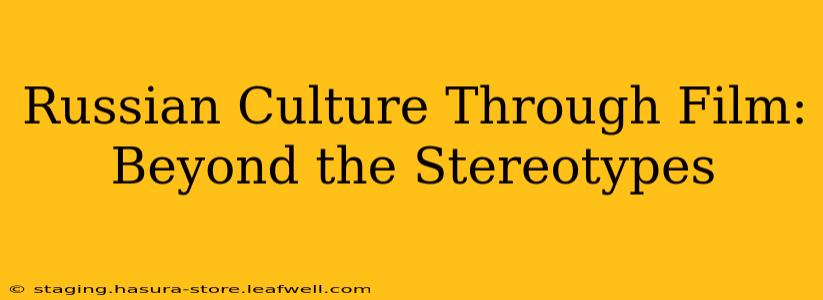For many, Russia conjures images of stark winters, sprawling landscapes, and perhaps, a certain brooding intensity. These images, often fueled by popular culture, can easily fall into harmful stereotypes. However, exploring Russian cinema provides a far richer, more nuanced understanding of Russian culture, its complexities, and its evolution. By moving beyond the clichés, we can discover a captivating tapestry woven from history, art, and the human spirit. This exploration delves into the multifaceted portrayal of Russian culture through film, revealing the depth and diversity often overlooked.
What are some common stereotypes of Russia portrayed in film?
Many Western portrayals of Russia have historically leaned on familiar tropes: the ruthless KGB agent, the stoic peasant, the vast, unforgiving landscape symbolizing a cold and unwelcoming society. These stereotypes often overshadow the richness and diversity of Russian culture. Films can perpetuate the myth of a monolithic society, ignoring the vast internal differences between regions and people. The focus on political intrigue or historical conflicts often overshadows everyday life and the nuances of human relationships.
How do Russian films challenge these stereotypes?
Thankfully, a wealth of Russian cinema actively challenges these simplistic portrayals. Films like Leviathan (2014) showcase the corruption and bureaucratic hurdles faced by ordinary citizens, revealing a side of Russia rarely seen in Hollywood productions. Works by Andrei Tarkovsky, such as Stalker (1979) and Solaris (1972), transcend political commentary, offering profound philosophical explorations of the human condition, set against the backdrop of unique Russian landscapes. These films engage with themes of spirituality, isolation, and the search for meaning, far removed from the typical spy thriller or historical epic.
What aspects of Russian culture are consistently highlighted in Russian films?
Several key aspects of Russian culture reappear consistently in Russian cinema. The importance of family and relationships is a recurring theme, often depicted with both heartwarming moments and intense conflict. The enduring connection to nature, particularly the vastness of the Russian landscape, serves as a powerful visual and emotional element, reflecting a deep-seated relationship between the people and their environment. Furthermore, the exploration of the historical legacy of the country and the impact of significant events, like the Soviet era, is often a central focus, revealing the enduring impact of the past on the present.
What are some essential films to watch to understand Russian culture?
To gain a deeper understanding, venturing beyond well-known titles is crucial. Consider exploring the works of Sergei Eisenstein, a pioneer of montage filmmaking whose Battleship Potemkin (1925) is a landmark achievement. For a more contemporary perspective, look at the films of Kira Muratova, known for her unconventional narrative styles and explorations of social alienation. Exploring films from different eras and directors offers a panorama of Russian cultural expressions, challenging preconceived notions and showcasing the vibrant diversity within the country.
Are there differences in how Russian culture is portrayed in Russian vs. Western films?
A significant difference lies in perspective and intention. Russian films often delve into the complexities and contradictions within their own society, aiming for a more nuanced and self-reflective portrayal. Western films, on the other hand, may prioritize specific narratives, often focusing on political intrigue or historical events, potentially reinforcing established stereotypes. This difference stems from the inherent biases and perspectives of the filmmakers and their intended audiences.
How can watching Russian films help us overcome stereotypes?
By actively engaging with Russian cinema, we can overcome stereotypes by witnessing authentic portrayals of Russian life and society. Exposure to diverse narratives, characters, and themes challenges pre-conceived notions and fosters empathy and understanding. The act of watching, analyzing, and discussing these films promotes critical thinking, challenging viewers to question assumptions and embrace the complexity of Russian culture.
Through careful consideration of diverse cinematic works, we can move beyond reductive stereotypes and appreciate the rich cultural tapestry of Russia. The journey through Russian film is not just about entertainment; it is a journey of discovery, revealing the depth and beauty of a civilization often misunderstood.

